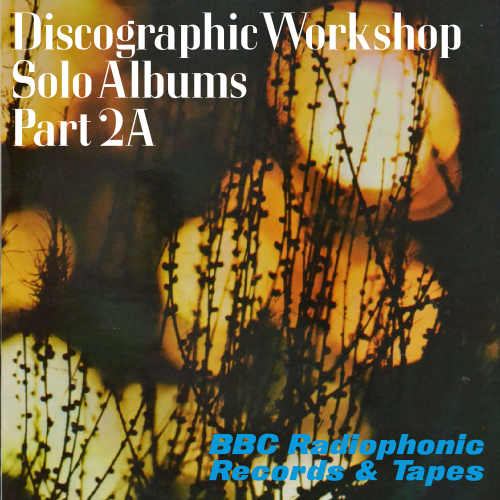- Part 2A
- Credit Where It’s Due
- Maddalena Fagandini – Language Courses
- Desmond Briscoe & Dick Mills – Narrow Boats
- David Cain – The Seasons
- Music By David Cain From Four Radio Plays
- Sources
Contents
Part 2A
Welcome to part 2 of an exhausting exhaustive review of The BBC Radiophonic Workshop’s releases on the BBC Enterprises vinyl and cassette labels. Part 2 covers solo LPs and I’ve included some production credits here too. Well, they had to go somewhere. This is Part 2 ‘A’ because it became too long to publish everything I wanted to say in a single post. Part 2 is now split into 3 posts, A, B and C.

Credit Where It’s Due
The composers at the Workshop were somewhat anonymous for most of their career. The most famous example of this is that the ‘Doctor Who’ theme was credited only to the composer of the score, Ron Grainer, and The Radiophonic Workshop. However, this injustice was corrected later and the composer and Workshop were given equal billing. The situation came about simply because in the early days there was no music being created at the Workshop. The drama department were the sponsors and the product was not musical. That was why Daphne Oram left – she wanted to make music. Through the early sixties though this started to change. With Magdalena Fagandini in the vanguard, and the community of producers at the BBC looking for original soundtracks at a cheap price, the music factory was gradually created.
Following a successful challenge by John Baker the creators could register their works with the Performing Rights Society (PRS). The mechanical copyright (MCPS) for Workshop recordings remains with the BBC, though. However, whilst they mostly toiled behind the scenes, under the mysterious sounding Radiophonic Workshop banner, they did sometimes get a chance to shine as individuals. There was due credit given on the Workshop’s showcase albums and indeed all the published works on the BBC’s record label, but there was a life outside the BBC too.
Delia Derbyshire and Brian Hodgson were moonlighting at the cutting edge of British electronic music during the sixties and we’ll take another look as that in a later part of this review. Paddy Kingsland knocked out a few Moog-based pop albums for EMI in the mid-seventies and Peter Howell had a back-catalogue from his pre-Workshop days, but most of the extra-curricular work was carried out pseudonymously for library labels.
One of the most interesting examples of anonymity – perhaps the ultimate – is Roger Limb’s musical stings for ‘Protect & Survive’. This public information film’s very existence was classified until it eventually leaked some years later, and Roger’s involvement apparently only gradually came to light after it became declassified. The UK government’s bleak, deeply unsettling and practically useless public information film from 1976 was given extra creepiness by Roger’s electronic idents. Mind you, everything from a bucket of sand to a cushion takes on a desolate and soul rending cast in this context. When you watch this film on how to protect yourself and yours from nuclear blasts and survive in their aftermath, you can only imagine what it would have been like to view as a real broadcast, hearing those short idents as the probably the only music on the air and the last you all might ever hear! The theme music to annihilation perhaps . . . but I reckon Roger would say it was just another job.
Maddalena Fagandini – Language Courses
It’s a bit early to start scraping the barrel, but to be complete I must mention Maddalena Fagandini’s language LP productions. Not for their Radiophonic content (there is, alas, none), but because Maddalena was a member of the Workshop and her work on language courses was very well respected.
Maddalena was at the workshop 1959 to 1966, but was often out doing other things around the BBC, including being seconded for the 1960 summer Olympic games in Rome. Having started in the Italian section of the BBC’s World Service in 1953 she was much in demand for her language skills. In 1963 she was released to work on Parliamo Italiano for BBC TV and an accompanying set of LPs was released by BBC Publications. These were the first records released by the BBC to the UK public and had catalogues numbers OP 1/2, OP 3/4 and OP 5/6.
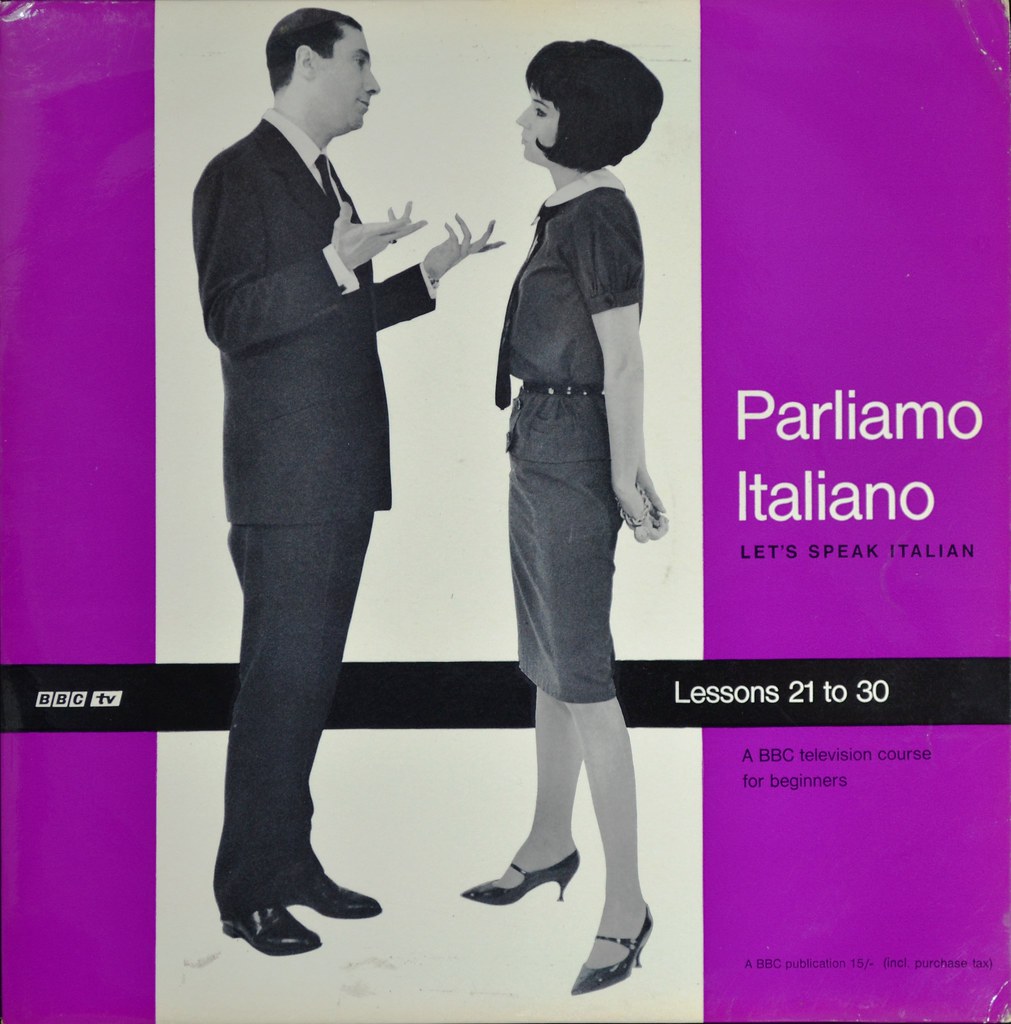
Parliamo Italiano – Let’s Speak Italian – Lessons 21-30 – OP 5/6 – 1964
Although Maddalena wasn’t credited on that LP she was eventually producing her own language series for television and the following list of accompanying albums bear her name as producer.:
- Si Dice Cosi – OP 127/128, OP 129/130 and OP 131/132 – 1968
- Kontakte – OP 213, OP 214 and OP 215 – 1974 – Dick Mills did something for this series according to the Workshop tape library. Possibly just editing.
- ¡Dígame! – OP 229, 231 and 233
- Buongiorno Italia – OP 260 – 1982
None of these albums seems to have any Radiophonics on them. The early albums have no sound effects or music at all. Later on we’ll look at some more of these language courses and the possibility of some Workshop input.
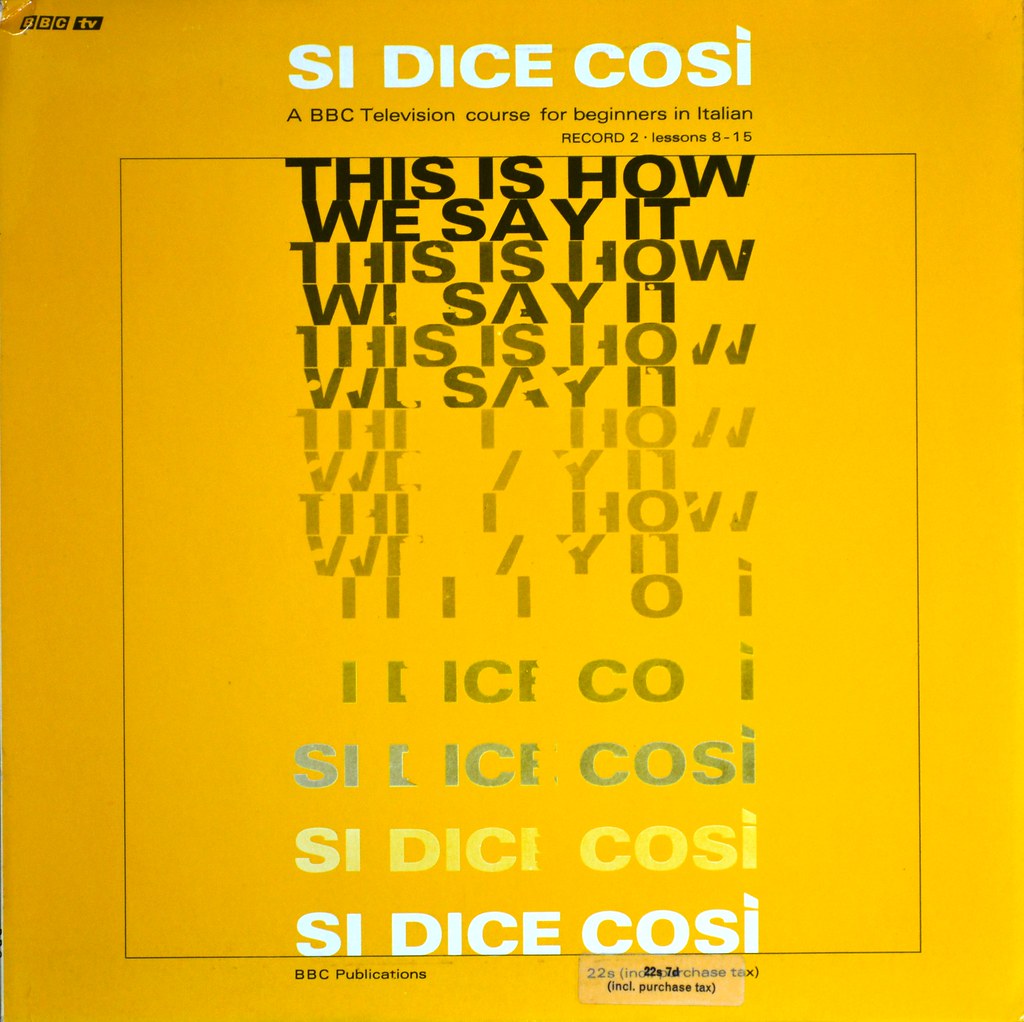
Si Dice Cosi – This How We Say It – Record 2 Lessons 8-15 – OP 129/130 – 1968
Desmond Briscoe & Dick Mills – Narrow Boats
“This record is an attempt to capture, in words, sound and music, something of the fast disappearing world of the ‘narrowboat’ and the people whose lives were inextricably bound to the boats and the canals on which they worked and travelled. “
Desmond Briscoe’s love of messing about on boats was mentioned in Part One of this review, where we had look inside his shed. While reading up on all things to do with the Radiophonic Workshop, I’ve come across quite a few mentions of his hobby. Unfortunately, it seems that not all his staff were quite so keen. Apparently, John Baker “did anything to avoid going to Desmond’s annual narrow boat parties” (according to John’s brother Richard).
At the time of this album’s release Briscoe was Chairman of the London & Home Counties Branch of the Inland Waterways Association and had his own narrow boat. It was a serious passion for the Workshop’s head and with BBC Records’ interest in releasing records about all kinds of old-fashioned or obsolete modes of transportation – buses, trams, traction engines and lots of steam railway engines – this oral history fitted right in.
Narrow Boats is a collection of reminiscences from boatmen and women interwoven with sound effects, music and songs, sung by David Balgrove. Briscoe trawled around the BBC archives for the source material and recorded the music and effects himself. Skilfully edited together by Dick Mills the result is a more compelling and amusing a listen than you might imagine. The different accents and dialects of the men and women relating the stories bring this history of a fast disappearing subculture immediately to life.
A shortened, stereo version was later broadcast on BBC Radio 4 in 1976 and the edit is credited to Workshop members Richard Yeoman-Clark & Roger Fenby. This was then released on the Argo record label.
As with the language LPs above, this isn’t really Radiophonic in either the original or musical sense of the word. It was however a product of the Workshop and the tapes are in the Workshop archive.
David Cain – The Seasons
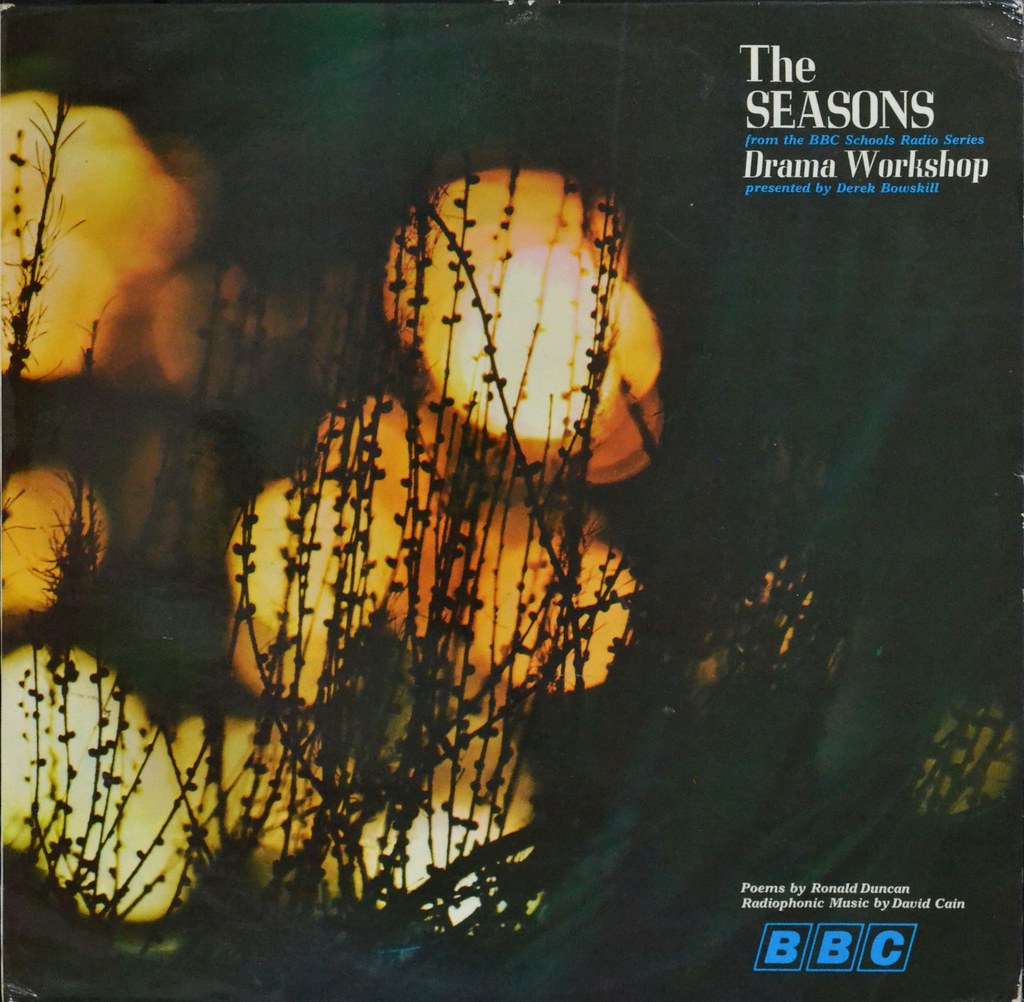
The Seasons is an album from the ‘Study’ Series LPs from the BBC Radio Enterprises and then BBC Records labels. The ‘Study’ records were spin-offs from Schools Radio programmes. These audio study aids cover poetry, history, literature, sociology, nature, music, sex education and dance, across more than 30 LPs released between 1969 and 1973. These records were not big sellers and were initially sold directly to schools and colleges by mail order. Later the ‘Study Series’ became properly marketed and available in the shops but The Seasons was released in the early stages. I will be looking at a couple of other releases from this catalogue in due course, but this one is the most completely Radiophonic of the lot. It didn’t sell well (and coming when the series was new probably didn’t help that) so, like some of the others in the ‘Study Series’ there are precious few in circulation. Thankfully Trunk Records reissued The Seasons in 2012, so it’s easily and cheaply available now.
Let’s Workshop this!
The Seasons was taken from BBC Radio for Schools’ Drama Workshop. It’s worth a brief etymological digression here to point out that the BBC Radiophonic Workshop was not called a workshop solely to imply it was a place for manufacturing sounds. As we know, thanks to Nicholas Craig, acting is the hardest job in the world (or in the case of Sci-Fi, the hardest job in many other worlds too) and the place where actors turn the raw materials of themselves and the scripts into living theatre (Nigel Planer does this better, doesn’t he?) is known as a workshop. The verb ‘to workshop’ denotes the process of turning base metal into theatrical gold (I’ll stop now). Because the Radiophonic Workshop had its roots in the Drama Department of the BBC its name had a neat double meaning, as engineering and technical know-how met the struggle to communicate the ineffable through the dramatic arts.
Man and the Seasons
Drama Workshop began in the autumn school term of 1966 and the first series was on the theme of the elements (air, fire, water and earth). The spring term of 1967 was given over to ‘The Growth of Man’. ‘Man and Society’ followed in the summer term and this included ‘A Game of Chess’ with contributions by Delia Derbyshire. These themes were repeated in the 67/68 academic year and then a new theme was introduced in the following year – ‘Man and the Seasons’. That in turn was repeated, in 69/70. Drama Workshop continued for another two years and the Radiophonic Workshop were contributing throughout. The year 70/71 saw work from Malcolm Clarke (‘The Ancient Mariner’, ‘The War of the Worlds’, ‘Rossum’s Universal Robots’, ‘All the Things You Are’) and Delia Derbyshire (‘Noah’).
‘Man and the Seasons’ was in 24 parts of 20 minutes and the music was not all Radiophonic. I’ve listed all the parts below and, as you will see, modern jazzers The Michael Garrick Trio (another rescue from obscurity by Trunk Records) were very much in evidence.
Autumn Term
- The Cornfield – 14th October 1968 – with music by The Michael Garrick Trio
- November Noises – 21st October 1968
- Fog: Guy Fawkes – 4th November 1968
- A Tree in Autumn – 11th November 1968 – with music by The Michael Garrick Trio
- Autumn: September, October, and November -18th November 1968 – with music by The Michael Garrick Trio
- ‘anyone lived in a pretty how town’ – 25th November 1968 – with music by The Michael Garrick Trio
- Autumn to Winter – 2nd December 1968
Spring Term
- Old Year, New Year – 13th January 1969
- Snow – 20th January 1969
- The Months of Winter – 27th January 1969
- Fire and Ice – 3rd February 1969
- The Spirit of Winter – 10th February 1969
- Winter into Spring – 17th February 1969 – with music by The Michael Garrick Trio
- The Spirit of Spring – 3rd March 1969
- A legend of Spring – 10th March 1969 – with music by The Michael Garrick Trio
- Persephone – 17th March 1969 – with music by The Michael Garrick Trio
- The Park in Spring – 24th March – with music by The Michael Garrick Trio
Summer Term
- Jabberwocky – 28th April 1969
- Sun and Water – 5th May 1969
- Summer in the park; summer on the beach – 12th May 1969 – with music by The Michael Garrick Trio
- Fire from the Sun – 19th May – with music by The Michael Garrick Trio
- The Apples of the Sun – 2nd June 1969
- The months: the seasons – 16th June 1969
- The Seasons: the year – 23rd June 1969

Hullo clouds hullo sky
According to The Seasons sleeve notes, Drama Workshop was “designed to stimulate dramatic dance, movement, mime and speech; and the improvisation of character and situation.” This kind of creative education was all the rage in the progressive atmosphere of the mid-to-late-twentieth century and the only suitable musical accompaniment would be similarly go-ahead sounds. Modern sounds, but somehow still redolent of nature and man’s place in the land and the seasons, are what David Cain wonderfully provided. We met two seasons on BBC Radiophonic Music – ‘Autumn’ and ‘Winter’ – and the other two seasons as well as all the months and a whole year are included here. Here though, as well as the music, each month and each season is presented as a short poem.
The months’ verses were written by Ronald Duncan who was a significant literary figure and playwright. Duncan was a prime mover in the revolution in British theatre in the 50s and although he was relatively conservative and dealt with religious themes he also had a keen interest in science and was a thoroughgoing literary modernist.
Duncan was no weekend enthusiast for the countryside either. In 1937 he bought an isolated and derelict small-holding in north Devon and created a community farm. This was an experiment in living off the land that was doomed to failure and it fell apart during the harsh war years. Although the farm was kept as the family home, it was a matter of “farming with one hand and writing with the other” for Duncan, who was increasingly drawn to London’s theatrical scene. He stayed there though, and now West Mill is available for rent as a holiday cottage. A more suitable location to listen to this album cannot be imagined!

The poems for the seasons were written by the presenter of Drama Workshop, Derek Bowskill – who also read all the verses. For some reason the Trunk Records release gives the credit for all the poems to Duncan but the original sleeve notes leave no room for doubt about their authorship.

Bowskill had made a name for himself as the Drama Advisor for Devon, setting up an arts centre in Crediton and practising the modern techniques of improvisation and evolved performances.
In 1964 Duncan and Bowskill collaborated on an experimental theatre piece called O-B-A-F-G… A One Act Play in Stereophonic Sound. This was staged without actors appearing before the audience. Instead the actors’ voices were played back, with lights and abstract lighting providing the visual accompaniment. Duncan wrote the text and Bowskill produced and directed, adding the visual components. He didn’t want anything on the stage at all. Slides were projected – 30′ by 30′ – but no record of them exists. More lost slides to follow. It’s interesting to compare this work with the ‘Inventions for Radio’ first broadcast in January 1964 – we’ll be back to that later too!
With Bowskill relocated to London and Duncan there often, the two exiles colluded on bringing the countryside to the classroom with the radical ideas from O-B-A-F-G providing the template.
Summerisle School Media Studies
Ronald Duncan could never be accused of patronising the school children who were the target audience of his verses. His sketches of nature’s annual cycle confront the young listeners with imagery and metaphors that might have caused more than a few smirks and furrowed brows in the classroom. But then, so does a lot of poetry in schools. Too much can be made of this. The months are the most visceral but Bowskill’s four seasons are relatively tame and we can assume teachers selected based on the age group.
There is some remarkably earthy symbolism suggestive of paganism, though. Given the era, the parallels with ‘The Wicker Man’ are hard to ignore. It’s tempting to think that The Seasons could have been made for the film – an alternative soundtrack, or as part of an expanded universe for Summerisle. It’s such a weird listening experience that it almost makes more sense in that fictional context than the one it actually came from! Closer inspection reveals that there are sprinkling of modern references in Bowskill’s poetry: X-rays, kaleidoscopes, roller coasters, a vacant lot. Where it clearly diverges from the pagan horror of ‘The Wicker Man’ is the Radiophonic music. The original ‘Wicker Man’ score is entirely folky – reflecting the islander’s antipathy to moderity – and was also – perhaps inevitably, given the previous links with this review – reissued by Trunk Records.
Medieval Machine Music
David Cain’s activities at the Workshop were slightly different to his contemporaries on the BBC Radiophonic Music LP, Delia Derbyshire and John Baker. Although he mucked in, creating idents, themes and incidental music, he was mostly working for radio on serious drama and schools’ programmes. Surprisingly, for someone working in one of the most advanced electronic music studios around, Cain was also carving out a niche working on Early Music. I will look more at what the Dickens pre-classical music was doing at the Workshop on the next record. The music on this album is realised through musique concrete techniques with a mixture of electronic and acoustic sources. There is more than a hint of the medieval about it though.
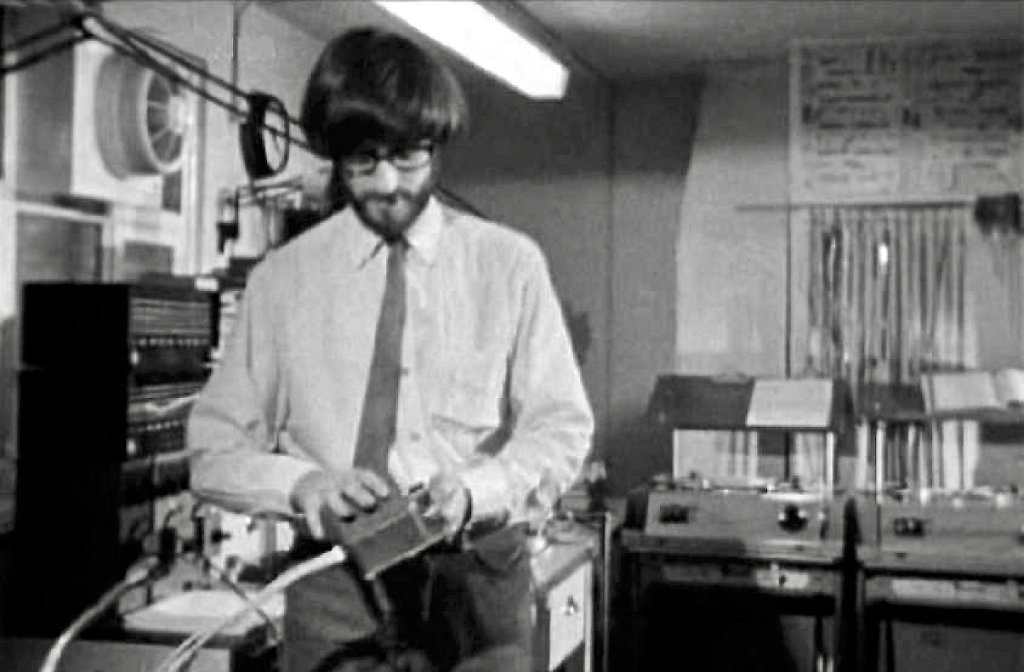
David Cain starting three reel-to-reel tape machines “at one and the same time c/o http://whitefiles.org”
Cain’s melodic figures might be folky and pre-classical but the arrangement and production never quite let you get lost in a rural past. Like a traditionally themed pub in a brutalist housing estate – called ‘The Plough’ and decked out with wagon wheels and barrels – you can enjoy the tension between the ancient and modern on this album. Bursts of white noise, echoes, tapes slowing down and the uncanny mood of the primitive Radiophonic techniques are contrasted with the more musical elements realised with simulations of wind and string instruments. Like Delia Derbyshire, Cain was a mathematician and seems to share some of her attention to detail with the harmonics of real sounds when using electronic sources. In the interview with Cain for the Trunk Records reissue, he makes it clear that he wasn’t trying to emulate any instrument – but he clearly wasn’t aiming for church organs, sitars or ‘space’ sounds either! Most people don’t know a rebec from a shawm anyway and it sounds authentically ancient to most. Pianos being hit by a hammer, the Workshop’s autoharp for plucked ‘ping noises’ and bowing the strings were used as sample sources, creating a rich contrast of tones.
The tunes were all based on the melody in ‘The Year’, which was created first. This was the original piece and the rest are simplified versions of that. For each poem, he then made variations.
Speaking to Johnny Trunk on Resonance FM, Cain did his best to recall what he was doing, but the process of its creation seems to remain as much a mystery to him as it does to us:
“A creative activity, in a creative medium, with very creative writing. And I have to make creative music to go with it all. [It] has to evoke atmosphere, emotion, all kinds of things, feelings, so kids could try to work out movement…”
“How to relate this creative output with rulers, scissors, sticky tape, machines that are supposed to be in sync but aren’t quite, instruments that make funny noises…That technical bit… How it is related to the emotional, creative result? I have no idea! I’m very happy that … I did it. If you want to know how – I don’t have a clue.”
Visual Stimulus
Not content with the poems and music Bowskill clearly wanted to bring of a bit of the magic of O-B-A-F-G to every school. Hence the LP had a exciting offer:

We are grateful once again to Johnny Trunk for tracking down Judith Bromley who along with Julia Ball produced artworks for these slides. As luck would have it, she obliged with the originals and slides of her paintings. The CD copy of the reissue includes reproductions of Bromley’s Spring and Winter.

Summery (sic)
Of all the solo LPs to come out of the Workshop The Seasons is the most satisfyingly artistic and peculiar. Sonically it’s the most authentically and identifiably Radiophonic. In terms of influence, it’s miles ahead of the others and even some of the compilations. The so-called hauntological movement led by Ghost Box Records cannot be understood fully without this album from a very particular time in the worlds of education, post-industrial pastoralism and electronic music.
Music By David Cain From Four Radio Plays

I’ve included this as it’s an LP by a member of the Workshop composed whilst they were working there. However, it’s not Radiophonic. This is traditional music played straight and with no obvious studio trickery on show. The original plays as broadcast were Radiophonic, though, as David Cain would add effects and treatments to create atmosphere for the whole piece. These four suites of music are taken from a series of landmark BBC radio drama productions by John Powell.
David Cain was very active in the theatre scene in London in the late sixties and early seventies. He was contributing music and ‘sound’ to productions by the Hampstead Theatre Club; The Studio Theatre, Oval House; The English Stage Company at the Royal Court (of which, incidentally, Ronald Duncan was a director); to the opening production at Theatre Upstairs at The Royal Court, and for Cambridge University repertory company.
This is as much an album of David Murrow’s music as it is David Cain’s, though. Munrow was a well-known personality and positive force in Early Music in the sixties and early seventies. After college and travel he had a stint playing for The Royal Shakespeare Theatre Wind Band, which led to a part-time lectureship in music and taking up a full-time career in music.

The original line up for The Early Music Consort of London (Munrow, second from left)
Sleeve Design
The ancient technique of paper marbling is used as the background here. It seems to be a monochrome version of what was probably a multicolour original. The monochrome approach was probably chosen to improve the legibility of the text. Andrew Prewett is the designer and he was probably trying to conjure up a bit of the spirit of the leather-bound folio editions of the works included on the record. More fancifully, fans of The Hobbit could read something into the abstract forms – dragon’s scales, perhaps? Furthermore, in 1971 it would have been taken by some as psychedelic and with Tolkien’s patronage by rockers both prog and metal – not least, Led Zeppelin – the lysergic echoes of oil projections from ‘happenings’ was, at least subliminally, implied. It’s certainly a striking sleeve and whilst not the most pleasing design, in my opinion, it is at least distinctive and would have given the record an eye-catching appeal in shops.
The Hobbit
The Early Music Consort was founded by David Munrow in 1968 and as ‘The Hobbit’ was produced the same year it hit the ground running. We’ll take a closer look at ‘The Hobbit’ in a later part of this review, though. Munrow was very busy in the following years; as well as the work presented on this album he had a weekly show on Radio 3 for younger listeners, Pied Piper, and there was barely a week when he wasn’t on the radio. Meanwhile David Cain was continuing a collaboration with Producer John Powell that had started in Cain’s first year at the Workshop, 1967.
Much Ado About Nothing
‘Much Ado About Nothing’ is the last suite on the album but was on the air a year after ‘The Hobbit’, in September 1969. Boasting a strong cast, including household names like Fenella Fielding, Ralph Richardson and Martin Jarvis, this was a well-received production and was praised for its sound design:
“as a composition in sound it [the production] must rank in the very top class. From its atmosphere, perspective and detail it was apparent that Mr. Powell had brought to it an exceptional aural imagination combined with a vast capacity for taking pains”. [David Wade, ‘Sound of Shakespeare’, The Times, 8 November 1969]
The Listener reviewer (also quoted on the sleeve notes) cited the addition of “fireworks, fountains and doves and cicadas”. This sort of aural colour was now typical of the Powell and Cain productions, albeit sadly lacking on this release. Powell explains in the sleeve notes that instead of simply reading the scripts and applying some sound effects they even went as far as building sets for the players to move about in. Once Cain and his engineering assistant (such as Dick Mills) had finished layering on the Special Sound and music, they had taken radio productions about as far as they could go.
Yes, there is a bit of “hey nonny nonny” in there too. The songs use the original lyrics by the Bard but the music is all Cain’s own.
Hajji Baba
‘The Adventures of Hajji Baba’ (or ‘One must live, all things considered’) was broadcast in March of 1970 and took listeners to early 19th century Persia. Munrow had a voracious appetite for all kinds of music and had been collector of instruments since his teaching days in South America. No trip abroad was complete without scouring markets for obscure things to play. Here he’s on “South American flutes and woodwind”, which doesn’t seem appropriate to Tehran, but I suppose they knew what they were doing. This suite of music is on side one, after ‘The Hobbit’ and demonstrates that Early Music practitioners were well placed to cover not only centuries of pre-classical music but also a wide geographic area. The lyrics were provided by poet, playwright and author Maida Stanier.
The Jew of Malta
‘The Famous Tragedy of the Rich Jew of Malta’ by Christopher Marlow was broadcast on Radio 3 on 10th May 1970 and starred Prunella Scales, amongst others. Back on more familiar ground with Shakespeare’s contemporary playwright, this suite starts side two and is thus paired with ‘Much Ado’. Again, the lyrics to the songs are from the original songs, by Marlow.
Alas poor Munrow
Shortly before his death, by his own hand in 1976, Munrow produced a TV series for Granada called simply ‘Early Music’. Watching clips pf this you get a sense of the force of personality Munrow possessed and what was lost with his passing. You can buy a DVD copy from http://www.davidmunrow.org.
His other claim to fame is that his recording of Holborne’s ‘The Faerie Round’ for recorder consort was included on the Voyager Golden Records.
Sources
- Disaster Education: ‘Race’, Equity and Pedagogy – By John Preston
- Obituary for Maddalena Fagandini – The Guardian
- Madeleine(sic) Fagandini – Forum for former BBC Staff
- JOHN BAKER BIOGRAPHY by Richard Anthony Baker – Trunk Records
- Narrow Boats on waterwaysongs.co.uk
- Desmond Briscoe Obituary – The Guardian
- Johnny Trunk interviews David Cain on Resonance FM
- some Landscapes blog review of The Seasons
- PlayGround review of The Seasons
- Q & A Between Julian House and David Cain – Trunk Records
- A Game of Chess – WikiDelia
- Crediton Arts Centre
- Hajji Baba on BBC Genome
- The Jew of Malta on BBC Genome
- David Munrow profile – ‘not even Mick Jagger has such versatile lips’ – The Guardian
- The Early Music Legend – ‘some details from the radio series of the Hobbit’

